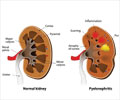Review the side-effects of Trimethoprim as documented in medical literature. The term "side effects" refers to unintended effects that can occur as a result of taking the medication. In majority of the instances these side-effects are mild and easily tolerable, however sometimes they can be more severe and can be detrimental.
If the side effects are not tolerable adjusting the dosage or switching to a different medication can help to manage or overcome side effects. If you have any doubts or questions, we recommend seeking advice from your doctor or pharmacist.
Skin: Rashes, itching, photosensitivity (sensitivity of the skin to sunlight), rarely serious skin reactions like Stevens Johnson syndrome and epidermal necrolysis.
Gastrointestinal System: Nausea, vomiting, glossitis and gastrointestinal discomfort, diarrhea.
Liver: Alterations in liver enzymes, cholestatic jaundice (rare).
Blood: Reduced blood counts, megaloblastic anemia.
Others: Muscle aches, headache, fever, aseptic meningitis, increased serum creatinine and blood urea nitrogen levels (which could indicate reduced kidney function).
• The blood counts should be monitored regularly in these patients.
If the side effects are not tolerable adjusting the dosage or switching to a different medication can help to manage or overcome side effects. If you have any doubts or questions, we recommend seeking advice from your doctor or pharmacist.
Skin: Rashes, itching, photosensitivity (sensitivity of the skin to sunlight), rarely serious skin reactions like Stevens Johnson syndrome and epidermal necrolysis.
Gastrointestinal System: Nausea, vomiting, glossitis and gastrointestinal discomfort, diarrhea.
Liver: Alterations in liver enzymes, cholestatic jaundice (rare).
Blood: Reduced blood counts, megaloblastic anemia.
Others: Muscle aches, headache, fever, aseptic meningitis, increased serum creatinine and blood urea nitrogen levels (which could indicate reduced kidney function).
Other Precautions :
• Reduced blood counts may occur in patients on long-term therapy.• The blood counts should be monitored regularly in these patients.
Drug Name : Trimethoprim
Trimethoprim generic Trimethoprim is prescribed to treat bacterial infections, mainly uncomplicated urinary tract infections It blocks the synthesis of tetrahydrofolate, the active form of folic acid, and therefore inhibits the growth of bacteria. Since it is an antibacterial, trimethoprim is ineffective and should not be used to treat viral infections such as common cold or flu. Trimethoprim is also used to treat middle ear infections or otitis mediaIt is used along with sulfamethoxazole or sulfadiazine for the treatment of several other bacterial infections.Trade Names for Trimethoprim
India :
Kolibitor |
Alcorim-F Tab |
Septran P- Susp |
Cadiprim |
Aubril (410mg/90mg) |
Aubril (205mg/45mg/5mL) |
Antrima DS (800mg/160mg) |
Antrima (200mg/40mg/5mL) |
Bactrim (400mg/80mg) |
Bactrim (100mg/20mg) |
Bactrim (200mg/40mg/5mL) |
Bactrim (200mg/40mg/5mL) |
Bactrim-DS (800mg/160mg) |
Moly KID Tablet (200mg/40mg) |
Sepmax (800mg/160mg) |
Septran (400mg/80mg) |
Septran (100mg/20mg) |
Septran (200mg/40mg/5mL) |
Synastat (800mg/160mg) |
Synastat (200mg/40mg/5mL)












